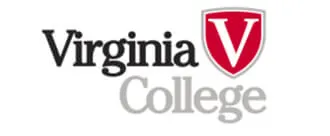Virginia College's Associate Degree in Nursing program is designed to help prepare you for a career as a registered nurse (RN). Continue reading for more information about this campus-based associate's degree program.
<h2 id="section---FrequentlyAskedQuestions">Frequently Asked Questions</h2>
<h3 id="section---WhatKindOfProgramIsIt"> What Kind of Program Is It?</h3>
<p>As a student of Virginia College's Associate Degree in Nursing program, you will have the opportunity to develop clinical skills and study various areas in the nursing profession. Specific areas of nursing covered in this Associate of Science degree curriculum include pediatric, mental health, maternal, and community health nursing. You will also study nursing fundamentals, nutrition, anatomy and physiology, nursing leadership roles, care management, and pharmacology. The program is designed to prepare you for RN licensing examinations. The Associate Degree in Nursing program is offered at several Virginia College campuses.
</p>
<h3 id="section---WhatAreThePrerequisites">What Are the Prerequisites?</h3>
<p>You should have an interest in helping people and working in a healthcare setting before enrolling in Virginia College's Associate Degree in Nursing program. You might have gained some experience by volunteering in a hospital or clinic, though this is not a prerequisite. Applicants to Virginia College programs should have a high school diploma or GED.
</p>
<h3 id="section---WhatAreTheCourseRequirements">What Are the Course Requirements?</h3>
<p>Once enrolled in this Associate of Science degree program at Virginia College, you must complete 112 quarter credit hours to earn this degree. A total of 76 credits are taken in area of concentration courses, with the remaining 36 credits covering general education and foundation requirements. General education courses include English composition, microbiology, college algebra, human development, and cultural diversity.
</p>
<p><u>Foundation Courses</u>
</p>
<p />
<table border="1"><tr><th>Course Code</th><th>Course Name</th></tr>
<tr><td>BIO 1140</td><td> Anatomy and Physiology I for Nursing</td></tr>
<tr><td>BIO 1160</td><td> Anatomy and Physiology II for Nursing</td></tr>
<tr><td>EDU 1010</td><td> Learning Framework</td></tr>
</table><p><u>Concentration Courses</u>
</p>
<p />
<table border="1"><tr><td>NUR 1020</td><td> Health Assessment and Physical Examination</td></tr>
<tr><td>NUR 1110</td><td> Fundamentals of Nursing</td></tr>
<tr><td>NUR 1150</td><td> Pharmacology and Medication Administration</td></tr>
<tr><td>NUR 2200</td><td> Adult Health Nursing I</td></tr>
<tr><td>NUR 2210</td><td> Adult Health Nursing II</td></tr>
<tr><td>NUR 2220</td><td> Psychiatric and Mental Health Nursing</td></tr>
<tr><td>NUR 2310</td><td> Maternal/Infant Nursing</td></tr>
<tr><td>NUR 2320</td><td> Pediatric Nursing</td></tr>
<tr><td>NUR 2410</td><td> Community Health Nursing</td></tr>
<tr><td>NUR 2420</td><td> Role Transition and Leadership</td></tr>
<tr><td>NUR 2430</td><td> Nursing Analysis and Evaluation</td></tr>
<tr><td>NUR 3000</td><td> Advanced Nursing Across the Lifespan</td></tr>
<tr><td>NUT 1200</td><td> Nutrition for Healthcare Providers</td></tr>
</table><h3 id="section---WhatCouldIDoAfterIGraduate"> What Could I Do After I Graduate?</h3>
<h4 id="section---CareerOpportunities">Career Opportunities</h4>
<p>Upon completion of Virginia College's Associate of Science in Nursing program, you could qualify to take national and state licensure exams. Once you are a licensed RN, you might find employment in a variety of healthcare environments, including:
</p>
<ul><li>Hospitals
</li><li>Clinics
</li><li>Long-term care facilities
</li><li>Private physician's offices
</li><li>Group medical offices
</li></ul><p><i>Advanced degrees may not be offered at Virginia College, and credits may not be transferable.</i></p>


.svg)


